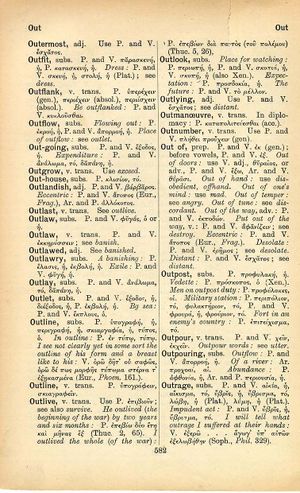outrage
From LSJ
Ὁ δὲ μὴ δυνάμενος κοινωνεῖν ἢ μηδὲν δεόμενος δι' αὐτάρκειαν οὐθὲν μέρος πόλεως, ὥστε ἢ θηρίον ἢ θεός → Whoever is incapable of associating, or has no need to because of self-sufficiency, is no part of a state; so he is either a beast or a god
English > Greek (Woodhouse)
subs.
P. and V. αἰκία, ἡ, αἴκισμα, τό, ὕβρις, ἡ, ὕβρισμα, τό, λώβη, ἡ (Plat.), λύμη, ἡ (Plat.). Impudent act: P. and V. ὕβρις, ἡ, ὕβρισμα, τό. I will tell what outrage I suffered at their hands: V. ἐξερῶ . . . ἅγωγʼ ὑπʼ αὐτῶν ἐξελωβήθην (Soph., Phil. 329). v. trans. P. and V. αἰκίζεσθαι (acc.), λυμαίνεσθαι (acc. or dat.), λωβᾶσθαι acc.) (Plat.), ὑβρίζειν (acc. or εἰς acc.).

